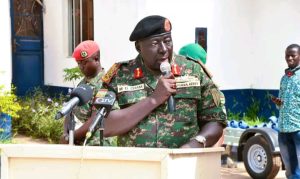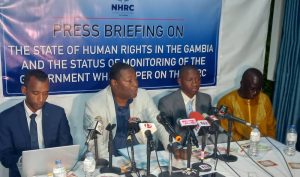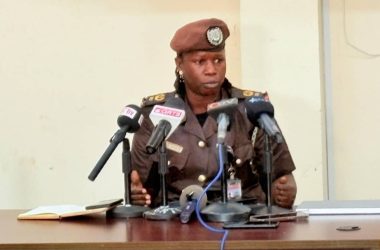The National Human Rights Commission (NHRC) has expressed serious concern over what it describes as the Gambia Armed Forces’ (GAF) lack of cooperation during investigations into a shooting incident involving a civilian.
The issue was highlighted in the Commission’s newly launched State of Human Rights Report 2024–2025, unveiled on Thursday at the Bakadaji Hotel in Kololi.
The report, the NHRC’s third since its establishment by an Act of Parliament, outlines key developments, challenges, and recommendations on human rights in The Gambia. Speaking at the event, NHRC Chairperson Emmanuel Daniel Joof said the Commission continues to face obstacles in carrying out its mandate, including limited cooperation from certain state institutions.
Shooting Incident Under Scrutiny
According to the 73-page report reviewed by JollofNews, the NHRC received information on August 26, 2024, about an incident in which a soldier allegedly shot and injured Mr. Stanislas Gomez, a passenger at a checkpoint near 2ray’s restaurant on the Bertil Harding Highway.
Following the report, the NHRC launched a fact-finding mission and visited the GAF Joint Headquarters in Banjul to gather information. However, Commission staff were reportedly denied permission to interview soldiers about the incident. Officers at the headquarters informed the NHRC team that they needed “the blessing of the Chief of Defence Staff” before any discussions could take place.
The NHRC later sent a formal letter requesting a full investigation into the matter to identify those responsible and ensure accountability. According to the report, GAF has yet to comply with that request a situation the Commission says “raises concerns about a lack of cooperation by the GAF.”
NHRC Urges Accountability and Reform
Speaking at the press briefing, Chairperson Joof confirmed that the NHRC had engaged GAF representatives on the issue but expressed frustration over the quality of dialogue. “The members representing the Chief of Defence Staff seemed very economical or lacked the IQ of the matter at hand,” he remarked.
Despite these challenges, Joof reaffirmed the Commission’s commitment to pursuing justice. “We will continue to push harder to ensure sanity over the shooting of Mr. Stanislas Gomez,” he said.
In its recommendations, the NHRC urged the Gambia Armed Forces to take concrete measures to prevent similar incidents. These include improving training for soldiers on the use of force, strengthening engagement with civilians, and ensuring that all security personnel operate in line with human rights standards at checkpoints.

Broader Human Rights Concerns
Beyond the shooting incident, the State of Human Rights Report 2024–2025 provides a broader assessment of human rights conditions across the country. It highlights progress in some areas but also identifies recurring issues such as prolonged pre-trial detention, violations during law enforcement operations, and limited public awareness of human rights protections.
The NHRC reaffirmed its role as an independent institution mandated to promote and protect human rights in The Gambia and called on all state agencies to uphold their obligations under national and international law.

“For the Commission to effectively deliver on its mandate, cooperation from all state actors, including the security sector, is crucial,” Joof emphasised.
The NHRC’s latest report serves as both a progress review and a call for greater accountability, as The Gambia continues its efforts to strengthen human rights and good governance in the post-transition era.





